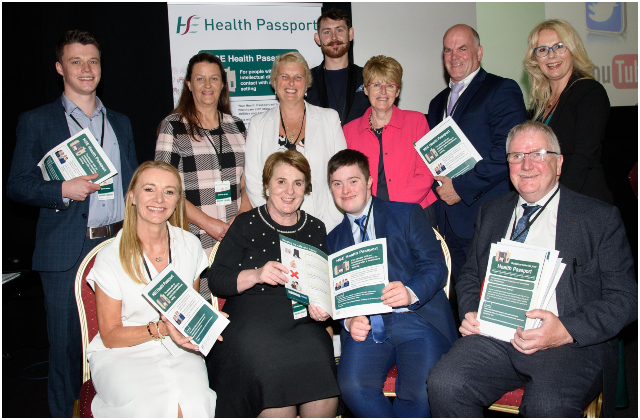![]()
You are here
Launch of the HSE Health Passport and Mission Possible short film

On Tuesday 18 June, the launch of the HSE Health Passport took place at Century Cinemas in Letterkenny, Co Donegal.
The launch was marked by the viewing of a high-end cinematic short film on the HSE Health Passport made to support the roll-out of an awareness campaign entitled "Mission Possible".
The launch was attended by over 200 delegates including representatives from the Department of Health, Donegal Oireachtas members and local media. Healthcare Professionals from the both Letterkenny and Sligo University Hospitals and Community Services across Community Healthcare Organisation Area 1 (Cavan, Donegal, Leitrim, Monaghan and Sligo) were also in attendance. Working collaboratively on this piece of work and in attendance on the day were the Public Health Agency, Northern Ireland and Ulster University.
The Health Passport is a document that will support people with intellectual disabilities to have equal access to healthcare and will help to let healthcare staff know all about the abilities and needs of people with an intellectual disability who come in to contact with a healthcare setting.
Paul Gallen Jnr, a young man who has Down Syndrome is the lead actor in the film. He did an excellent job of creatively getting the message of the rights of people with intellectual disability to equal access to health care and how the Health Passport can support this. He stated "Being involved in the making of the movie to promote the HSE Health Passport has been a wonderful experience for me. This passport allows me to communicate my health needs to staff working in the
HSE.”
Mr Gerry Lane, Consultant in Emergency Medicine at Letterkenny University Hospital spoke at the launch stating, "The benefits of a Health Passport for people with an intellectual disability when accessing acute services are many, including enabling their voice to be heard by frontline health care professionals”.
Dr Siobhan O'Halloran, Chief Nursing Officer, Department of Health commented, "The Health Passport contains a number of sections that will provide information about the person including personal details, communication abilities, medical history etc. This Passport will help health care staff to provide safer better integrated care that is person centred and compassionate.”
Niamh Walsh, PhD Researcher, Ulster University, stated “Earlier this week Paul Gallen and I had the unique opportunity to present President Michael D Higgins with a copy of the Passport at the Bloomsday Garden Party in Áras an Uachtaráin.”
The Nursing and Midwifery Planning & Development Unit (NMPDU) in the North West have over the last two years adapted, piloted and evaluated a Health Passport for people with Intellectual Disability using both Letterkenny University Hospital and Sligo University Hospital as their pilot hospital sites. This work was led by the Director of the NMPDU North West, Dr Anne Gallen who commented, "A standardised HSE Health Passport for people with an intellectual disability will truly enable person-centred and compassionate integrated care as well as driving safer health care delivery. Implementation of the HSE Health Passport will be progressed via the management structures within Community Healthcare Organisation Area 1 and Saolta University Healthcare Group. The digital awareness campaign developed by Re-Act Productions has provided healthcare professionals working in the HSE with an innovative and creative way of understanding the value of the health passport and the potential for its transferability to other patient groups."
The HSE Health Passport will be available to people with an intellectual disability within the Saolta University Health Care Group and the Community Healthcare Organisation Area 1 following the launch.
To watch the video on Health Passport "Mission Possible", go to: https://youtu.be/1erY9tb9C7o
The article above is specific to the following Saolta hospitals::
All Hospitals
Keywords:
